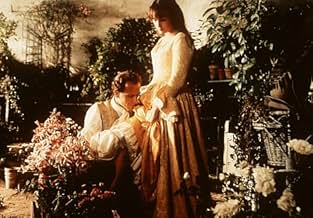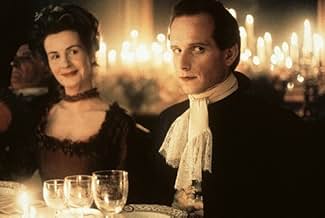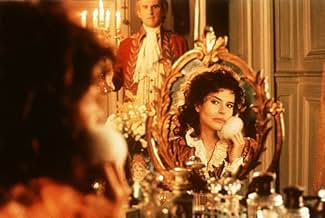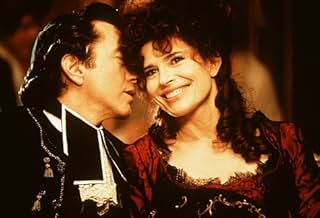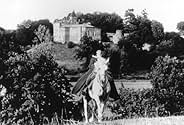AVALIAÇÃO DA IMDb
7,3/10
8,4 mil
SUA AVALIAÇÃO
Adicionar um enredo no seu idiomaTo get royal backing on a needed drainage project, a poor French lord must learn to play the delicate games of wit at court at Versailles.To get royal backing on a needed drainage project, a poor French lord must learn to play the delicate games of wit at court at Versailles.To get royal backing on a needed drainage project, a poor French lord must learn to play the delicate games of wit at court at Versailles.
- Direção
- Roteiristas
- Artistas
- Indicado a 1 Oscar
- 20 vitórias e 17 indicações no total
Judith Godrèche
- Mathilde
- (as Judith Godreche)
Avaliações em destaque
This reminds me a lot of Dangerous Liaisons (1988) and Valmont (1989) in its cynicism and sharp wit. Set in France during the same time period (the eve of the French Revolution--that's the eighteenth century, reviewers), Ridicule concentrates not so much on sexual intrigues (although there is plenty of that) but on cynical wit as though in homage to Voltaire, France's master of satire whose spirit is suffused throughout.
First a warning. Don't let the rather gross crudity of the opening scene mislead you. That is meant merely as satire, not as a presaging of further crudities to come. It is also meant as a kind of cinematic joke since there is no comparable female nudity in the entire film. Indeed, there is no comparable, shall we say "expression," anywhere in legitimate filmdom that I am aware of. So let it pass or close your eyes.
Charles Berling stars as Gregoire Ponceludon de Malavoy, a country engineer who comes to Versailles to get financial backing to drain a swamp to save the peasants who are dying of mosquito-borne disease. ("Peasants feed aristocrats as well as mosquitos.") He discovers very quickly that a way to an audience with Louis XVI is through gaining a reputation as a clever courtier. Guided by M. Bellegarde (Jean Rochefort), a retired courtier himself, Ponceludon quickly picks up the games of wit and ridicule that reign at court. His quick and clever mind and youthful good looks gain the attention of the king's mistress, Madame de Blayac (Fanny Ardant) who demonstrates how access to the king can come through her bedroom. Ponceludon is sincere only in his desire to drain the swamp and so readily allows himself to become another of Blayac's lovers in exchange for a chance to present his program to Louis XVI.
At the same time he meets Bellegarde's daughter Mathide (Judith Godrèche), an idealistic beauty with a scientific bent, who is betrothed to a dying old man of wealth and position. They fall in love, but their differing agendas keep them apart.
What makes this film such a delight is the delicious way it satirizes the decadent court of Louis XVI. The dramatic irony is superb and absolute in the sense that at no time does director Patrice Leconte give even the slightest hint that any of the byzantine sycophants at court are aware that Danton and the Terror await them. Throw in the impending Industrial (and scientific) Revolution symbolized in the form of Ponceludon and Mathide, and the ancien régime with its antiquated feudal titles and corrupt privilege is seen for what it was, a parasitic anachronism, ripe to rot for destruction.
The sets, the direction and especially the acting are excellent. Veteran Rochefort is particularly good in a part that depends on a directive and expressive face amid the whispers at court. Berling is smooth and believable as a man with a noble mission, adroit at repartee, love and dueling, a modest and earnest hero.
Godrèche is good, but seems a little restrained here. She is an impossibly healthy, handsome beauty no man could resist. I first saw her as a 17-year-old in The Disenchanted (1990) where her adolescent charm was carefully and craftily displayed by director Benoît Jacquot. Here Leconte concentrates on her strength of character.
Fanny Ardant's Madame de Blayac is a Machiavellian mistress of love's duplicity, very much like the Marquise de Merteuil from Dangerous Liaisons and Valmont. Her performance compares favorably with that of Glenn Close and Annette Bening, respectively, although there is an earthy quality to Ardant that seems most realistic. Her character is also more vulnerable.
The sets are sumptuous without being artificially showy. The gray, high-topped wigs and the beaked-nosed masks at ball are charming and, along with the gilded attire, the caked makeup, etc., somehow suggest the true state of costume and personal hygiene circa 1784, reminding me that in those days people did not generally wear underpants or take showers.
Some bon mots:
"The soul of wit is to know one's place."
When asked by the king to say something witty about the king himself, Ponceludon returns: "The king is not a subject." The king asks if this is not a (lowly) pun, but is assured that it is a "play on words."
When Blayac discerns that Ponceludon is not entirely smitten with her, she responds, "Learn to hide your insincerity so that I may yield without dishonor."
The film closes with a scene in England on a cliff overlooking the English channel. Bellegarde and another reflect on the changes after the revolution: "Wit was the very air we breathed." "Now the bloated rhetoric of Danton rules in place of wit." Bellegarde's hat is blown off by the wind. His companion remarks: "Better your hat than your head."
By the way, the subtitles (and this is usually not the case) are excellent, inventive and faithful enough, while comfortably brief, to have been done by a professional translator instead of by someone handy who is passably bilingual.
(Note: Over 500 of my movie reviews are now available in my book "Cut to the Chaise Lounge or I Can't Believe I Swallowed the Remote!" Get it at Amazon!)
First a warning. Don't let the rather gross crudity of the opening scene mislead you. That is meant merely as satire, not as a presaging of further crudities to come. It is also meant as a kind of cinematic joke since there is no comparable female nudity in the entire film. Indeed, there is no comparable, shall we say "expression," anywhere in legitimate filmdom that I am aware of. So let it pass or close your eyes.
Charles Berling stars as Gregoire Ponceludon de Malavoy, a country engineer who comes to Versailles to get financial backing to drain a swamp to save the peasants who are dying of mosquito-borne disease. ("Peasants feed aristocrats as well as mosquitos.") He discovers very quickly that a way to an audience with Louis XVI is through gaining a reputation as a clever courtier. Guided by M. Bellegarde (Jean Rochefort), a retired courtier himself, Ponceludon quickly picks up the games of wit and ridicule that reign at court. His quick and clever mind and youthful good looks gain the attention of the king's mistress, Madame de Blayac (Fanny Ardant) who demonstrates how access to the king can come through her bedroom. Ponceludon is sincere only in his desire to drain the swamp and so readily allows himself to become another of Blayac's lovers in exchange for a chance to present his program to Louis XVI.
At the same time he meets Bellegarde's daughter Mathide (Judith Godrèche), an idealistic beauty with a scientific bent, who is betrothed to a dying old man of wealth and position. They fall in love, but their differing agendas keep them apart.
What makes this film such a delight is the delicious way it satirizes the decadent court of Louis XVI. The dramatic irony is superb and absolute in the sense that at no time does director Patrice Leconte give even the slightest hint that any of the byzantine sycophants at court are aware that Danton and the Terror await them. Throw in the impending Industrial (and scientific) Revolution symbolized in the form of Ponceludon and Mathide, and the ancien régime with its antiquated feudal titles and corrupt privilege is seen for what it was, a parasitic anachronism, ripe to rot for destruction.
The sets, the direction and especially the acting are excellent. Veteran Rochefort is particularly good in a part that depends on a directive and expressive face amid the whispers at court. Berling is smooth and believable as a man with a noble mission, adroit at repartee, love and dueling, a modest and earnest hero.
Godrèche is good, but seems a little restrained here. She is an impossibly healthy, handsome beauty no man could resist. I first saw her as a 17-year-old in The Disenchanted (1990) where her adolescent charm was carefully and craftily displayed by director Benoît Jacquot. Here Leconte concentrates on her strength of character.
Fanny Ardant's Madame de Blayac is a Machiavellian mistress of love's duplicity, very much like the Marquise de Merteuil from Dangerous Liaisons and Valmont. Her performance compares favorably with that of Glenn Close and Annette Bening, respectively, although there is an earthy quality to Ardant that seems most realistic. Her character is also more vulnerable.
The sets are sumptuous without being artificially showy. The gray, high-topped wigs and the beaked-nosed masks at ball are charming and, along with the gilded attire, the caked makeup, etc., somehow suggest the true state of costume and personal hygiene circa 1784, reminding me that in those days people did not generally wear underpants or take showers.
Some bon mots:
"The soul of wit is to know one's place."
When asked by the king to say something witty about the king himself, Ponceludon returns: "The king is not a subject." The king asks if this is not a (lowly) pun, but is assured that it is a "play on words."
When Blayac discerns that Ponceludon is not entirely smitten with her, she responds, "Learn to hide your insincerity so that I may yield without dishonor."
The film closes with a scene in England on a cliff overlooking the English channel. Bellegarde and another reflect on the changes after the revolution: "Wit was the very air we breathed." "Now the bloated rhetoric of Danton rules in place of wit." Bellegarde's hat is blown off by the wind. His companion remarks: "Better your hat than your head."
By the way, the subtitles (and this is usually not the case) are excellent, inventive and faithful enough, while comfortably brief, to have been done by a professional translator instead of by someone handy who is passably bilingual.
(Note: Over 500 of my movie reviews are now available in my book "Cut to the Chaise Lounge or I Can't Believe I Swallowed the Remote!" Get it at Amazon!)
Ridicule is a French film which takes place in 1783, a few years before Louis XVI lost the ability to wear a hat; where "...in this country, vices are without consequence, but ridicule can kill." The film is about the effect of wit and word play on people's lives and careers. Malicious, mannered and highly enjoyable. Charles Berling, Jean Rochefort, Bernard Giraudeau and Fanny Ardant are excellent. A man would be a fool not to want to bed Ardant, and even more a fool to trust her. The love affair between Berling and his deep-diving sweetheart is amusing and endearing.
The film is sumptuously mounted. The dialogue is so clever a knowledge of French might be in order, but the English subtitles do a superb job of conveying the witty, cruel, self-serving word play.
The film is sumptuously mounted. The dialogue is so clever a knowledge of French might be in order, but the English subtitles do a superb job of conveying the witty, cruel, self-serving word play.
I have to say that this film is certainly not for an audience with a predilection for sophomoric or low-brow "hu-mah". The action in this film is nearly entirely a matter of verbal cut and thrust and quick repartee. A period piece shot in pre-revolutionary France in the days of King Louis and Marie Antoinette, Ridicule portrays an era when wit could earn a passport into courtly favor, and one verbal faux pas could ruin a man's reputation and position in society. Charles Berling's performance as Ponceledon, the rustic nobleman trying to bring his petition to drain the disease-infested swamps of his region before the King of France, is in a word, superb... Fanny Ardant is also a well-cast Madame de Blayac, the dexterously duplicitous countess who appears disposed towards aiding Ponceledon in his suit. Ridicule is a genuinely delightful comedy. I recommend it highly even to those who do not speak French. My rating: 9/10.
RIDICULE deserved all the lavish praise it engendered upon its release in 1996. As a period piece (France in the final throes of King Louis XVI) it is one of the finest - visually, contextually, musically, AND it is wonderfully intelligent! Unlike many period pieces that serve as elegant decoration for meager stories, RIDICULE carries pungent statements about the decline of aristocracy and the whispers of the cause of democracy.
A poor humanitarian travels from the ill swamps of Southern France to the court of Versailles to seek funding from the Royal Court to correct the deplorable living conditions ignored by the King. Upon arrival he finds a vapid society diverting attention from problems that plague the kingdom by inventing word games whose purpose is to find who can is best able to ridicule the fellow shallow players of this verbal chess game. Finding he has the gift to outclass the court with his verbal wit our humanitarian is 'accepted' into nobility and spars with the finest. For a while our humanitarian's focus is diffused by women, duels, and other diversions of the court until he finally regroups his cause and returns to the suffering sector from whence he came...with the ability to correct the conditions at last.
The cast of Director Patrice Laconte's gem is exemplary and includes such fine actors as Charles Berling, Fanny Ardant, Jean Rochefort, Judith Godrèche, Bernard Giraudeau, and the mute role so sensitively performed by Bruno Zanardi (the one constant presence who keeps us reminded of just how absurdly low the court of France has fallen). The costumes by Christian Gasc (especially in the masked ball) are some of the more sumptuous ever created and the musical score by Antoine Duhamel and cinematography by Thierry Arbogast capture the atmosphere of both comedy and underling decay that makes this film so fine.
Truly a film for those who enjoy double entendres and acerbic wit, this film grows better with repeated viewings. In French with English subtitles. Grady Harp
A poor humanitarian travels from the ill swamps of Southern France to the court of Versailles to seek funding from the Royal Court to correct the deplorable living conditions ignored by the King. Upon arrival he finds a vapid society diverting attention from problems that plague the kingdom by inventing word games whose purpose is to find who can is best able to ridicule the fellow shallow players of this verbal chess game. Finding he has the gift to outclass the court with his verbal wit our humanitarian is 'accepted' into nobility and spars with the finest. For a while our humanitarian's focus is diffused by women, duels, and other diversions of the court until he finally regroups his cause and returns to the suffering sector from whence he came...with the ability to correct the conditions at last.
The cast of Director Patrice Laconte's gem is exemplary and includes such fine actors as Charles Berling, Fanny Ardant, Jean Rochefort, Judith Godrèche, Bernard Giraudeau, and the mute role so sensitively performed by Bruno Zanardi (the one constant presence who keeps us reminded of just how absurdly low the court of France has fallen). The costumes by Christian Gasc (especially in the masked ball) are some of the more sumptuous ever created and the musical score by Antoine Duhamel and cinematography by Thierry Arbogast capture the atmosphere of both comedy and underling decay that makes this film so fine.
Truly a film for those who enjoy double entendres and acerbic wit, this film grows better with repeated viewings. In French with English subtitles. Grady Harp
I have seen this film recently on video after having missed it at the cinema and on TV. I knew it would be all about cruelty of words and superficiality of elites. Indeed, this film is a true gem, very well played, sharp and quick. It tells the story of a young provincial nobleman discovering the Versailles Court as he tries to get funding for his project. What he finds will lead the nobility to its brutal end 6 years later: futility, self-conceit, disinterest to the people's problems, superficiality of relationships (all of which still pervade it modern French elite, to some respects as was evident from revelations of Mitterrand's shameful reign). Of course the political message is important. But equally if not more important -or pleasurable- are the dialogues. French can be so brutal, insidious, cruel, tortured, witty when used a propos that I'm not sure the non-French speakers could get the most of the dialogues. Certainly the absolutely brilliant rhymes contest would be somehow lost in English subtitles. A very good 9/10 for this movie, and a bit less if you don't get the dialogues.
Você sabia?
- CuriosidadesIt is worth noting the presence of a real historical figure, father Charles Michel de l'Épée. The abbot de l'Épée was one of the first to take an interest in the issue of public education for the deaf, giving priority to sign language as a language of instruction.
- Erros de gravaçãoAround 44 min, when Grégoire is talking with Madame de Blayac, her left hand is touching the table, but in the next shot it's just hanging on the chair's the armrest.
- Citações
Gregoire Ponceludon de Malavoy: Peasants feed aristocrats as well as mosquitoes.
Principais escolhas
Faça login para avaliar e ver a lista de recomendações personalizadas
- How long is Ridicule?Fornecido pela Alexa
Detalhes
- Data de lançamento
- País de origem
- Idioma
- Também conhecido como
- Ridicule
- Locações de filme
- Parc du Château de Versailles, Versailles, Yvelines, França(palace garden and ponds)
- Empresas de produção
- Consulte mais créditos da empresa na IMDbPro
Bilheteria
- Orçamento
- FRF 50.000.000 (estimativa)
- Faturamento bruto nos EUA e Canadá
- US$ 1.979.768
- Faturamento bruto mundial
- US$ 1.979.768
Contribua para esta página
Sugerir uma alteração ou adicionar conteúdo ausente

Principal brecha
By what name was Caindo no Ridículo (1996) officially released in India in English?
Responda

